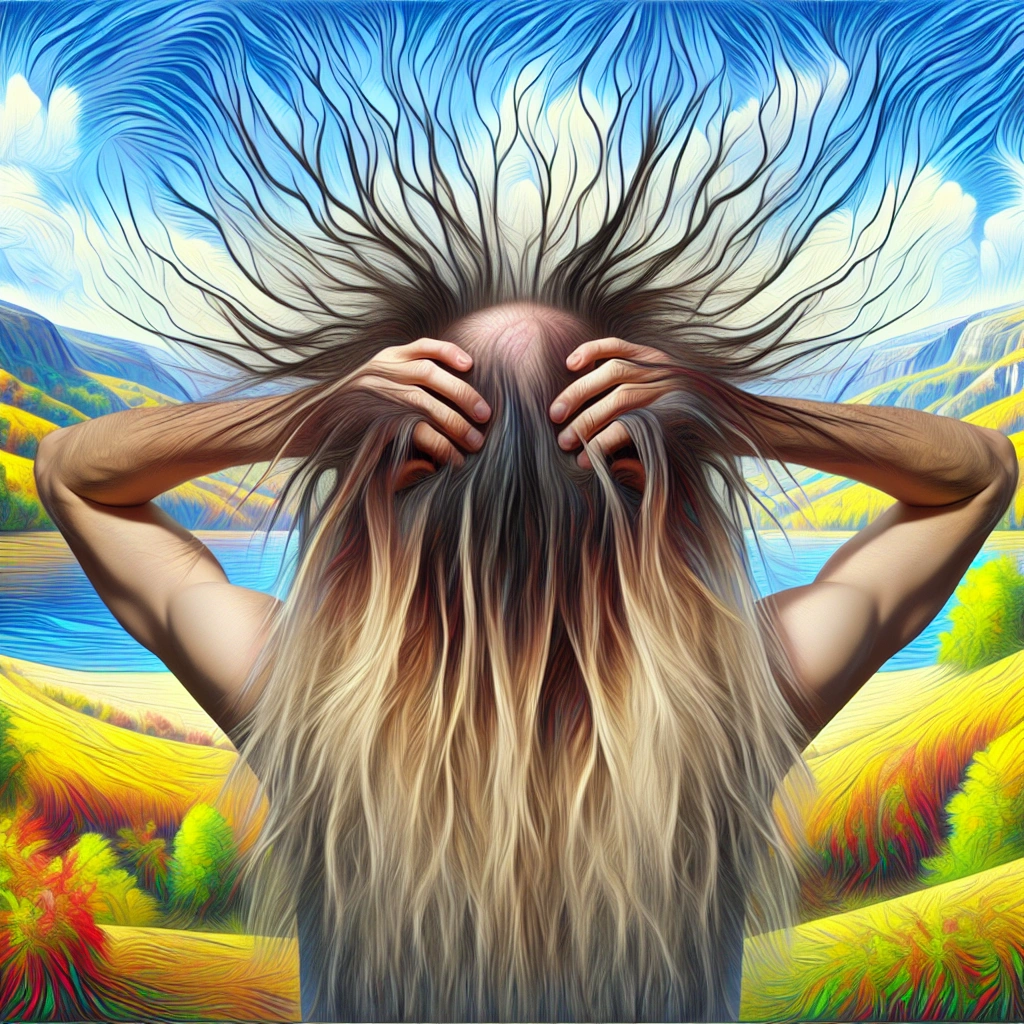

Hair loss from stress can be caused by a condition called telogen effluvium, where significant stress pushes a large number of hair follicles into a resting phase. This can result in sudden hair loss while combing or washing the hair.
Understanding the physical effects of stress is important as long-term or chronic stress can put people at risk for various health problems, including hair loss. Chronic stress has been linked to hair loss, as it can disrupt the normal hair growth stages and lead to excessive shedding.
It’s essential to recognize the signs of hair loss from stress, such as sudden shedding, thinning of the hair, and hair falling out in clumps, in order to seek appropriate treatment and address the underlying stress factors.
Check out this Youtube video: Want to know what hair loss from stress looks like? Watch this video to learn about the signs of stress-related hair loss and what you can do to stop it.
Understanding Hair Loss
Definition of hair loss
Hair loss, also known as alopecia, is the condition characterized by a reduction in hair density and the gradual thinning or loss of hair from the scalp or body. It can be caused by various factors such as genetics, hormonal changes, medical conditions, or stress, leading to visible baldness or a significant decrease in hair volume.
Different types of hair loss
- Androgenetic Alopecia: This genetic condition, commonly known as male or female pattern baldness, results in gradual hair thinning and receding hairline.
- Telogen Effluvium: Stressful events can lead to this type of temporary hair loss, causing a significant number of hair follicles to enter the resting phase and eventually fall out.
- Alopecia Areata: An autoimmune condition where the immune system mistakenly attacks the hair follicles, resulting in hair loss in small, round patches.
Role of stress in causing hair loss
Stress plays a significant role in hair loss, particularly through a condition known as telogen effluvium. When the body experiences significant stress, it can push a large number of hair follicles into a resting phase, leading to noticeable hair shedding within a few months.
This type of hair loss is often reversible and can improve once the stress is alleviated.
Signs and Symptoms of Hair Loss from Stress
Excessive hair shedding
Experiencing excessive hair shedding due to stress can be distressing, as it may seem like you’re losing more hair than usual. This can lead to finding clumps of hair on pillows, in the shower, or on hairbrushes.
It’s important to note that while some hair shedding is normal, an increased amount could indicate the impact of stress on hair health.
Thinning of the hair
Thinning of the hair is a common symptom of hair loss from stress. You may notice that your hair doesn’t appear as full or voluminous as it used to be.
This can be particularly concerning when it occurs noticeably along the parting or at the crown of the head.
Receding hairline
A receding hairline, often associated with male pattern baldness, can also be a result of hair loss due to stress. It’s characterized by the gradual thinning and backward movement of the hairline, creating a V-shaped pattern at the front of the head.
Bald spots or patches
Stress-related hair loss can manifest in the form of bald spots or patches on the scalp. These areas may appear smooth and devoid of hair, indicating localized hair loss due to stress.
It’s an alarming sight for many individuals and can contribute to increased stress levels, perpetuating a challenging cycle.
Impact of Stress on Hair Follicles
Stress has a profound impact on hair follicles, primarily through the hormone cortisol. High levels of cortisol have been shown to impede the synthesis and hasten the degradation of crucial skin components, such as hyaluronan and proteoglycans, by about 40%.
Stress hormone cortisol and its effects on hair follicles
The stress hormone cortisol significantly influences the function and cyclic regulation of hair follicles. It has been established that high levels of cortisol can lead to a reduction in the synthesis and an acceleration of the degradation of essential skin elements crucial for hair health.
Disruption of the hair growth cycle
Prolonged stress can disrupt the natural hair growth cycle, causing a reduction in hair growth. This disruption can lead to hair follicles remaining in an extended resting phase, resulting in decreased hair growth and potential hair loss.
Telogen effluvium and its relationship to stress
Telogen effluvium, a type of hair loss, is commonly associated with significant stress. It occurs when immense stress induces a large number of hair follicles to enter a resting phase, leading to substantial hair thinning, particularly around the crown of the head.
Psychological Effects of Hair Loss from Stress
Hair loss from stress can have significant psychological effects on individuals. The emotional impact is often characterized by feelings of self-consciousness, embarrassment, frustration, and jealousy.
Individuals experiencing hair loss may feel increasingly self-conscious about their appearance, leading to a decrease in their self-esteem and confidence.
Moreover, hair loss from stress can contribute to increased levels of anxiety and depression. The visible effects of hair loss can exacerbate feelings of anxiety, leading to a heightened sense of distress and concern.
Similarly, individuals experiencing hair loss may also struggle with feelings of depression related to their changing appearance, impacting their overall well-being and mental health.
| Psychological Effects of Hair Loss from Stress |
|---|
| 1. Emotional Impact |
| Hair loss can lead to self-consciousness, embarrassment, frustration, and jealousy. |
| 2. Decreased Self-Esteem |
| Individuals may experience a decrease in self-esteem and confidence due to hair loss. |
| 3. Anxiety and Depression |
| Hair loss can contribute to heightened anxiety and feelings of depression. |
Management and Treatment of Stress-Induced Hair Loss
Stress management techniques
Stress management techniques are crucial in addressing hair loss caused by stress. Practice relaxation methods such as deep breathing, meditation, and yoga to reduce stress levels and prevent further hair loss.
Healthy lifestyle changes
Making healthy lifestyle changes is essential to combat stress-induced hair loss. Focus on consuming a balanced diet rich in vitamins, minerals, and protein to support hair growth. Additionally, prioritize regular exercise to alleviate stress and improve overall well-being.
Professional treatments for hair loss
Seeking professional treatments for hair loss from stress can provide effective solutions. Consult a dermatologist or hair specialist to explore options such as topical treatments, supplements, or corticosteroid medications to manage and reverse stress-induced hair loss.
Role of Genetics in Stress-Induced Hair Loss
Genetic predisposition to hair loss
Genetic predisposition plays a significant role in stress-induced hair loss. Scientific studies have identified specific genes, such as the androgen receptor gene and the aromatase gene, which are associated with male pattern baldness. Female pattern baldness is also thought to involve a complex interplay of genetic factors.
Interplay between stress and genetics in hair loss
The interplay between stress and genetics in hair loss is intriguing. Stress and hair loss can be related, and three types of hair loss can be associated with high stress levels, including telogen effluvium. Additionally, researchers have found that a stress hormone impairs the stem cells necessary for hair growth, shedding light on potential ways to treat hair loss related to stress.
| Genetic Aspects | Stress Aspects |
|---|---|
| Specific genes associated with male pattern baldness | Stress-related hair loss is linked to telogen effluvium |
| Complex genetic factors influencing female pattern baldness | Stress hormone impairment of hair growth stem cells |
Addressing Underlying Stress Factors
Identifying sources of stress
Identifying sources of stress is the first step to understanding and managing the impact of stress on your body and mind. Whether it’s work pressure, financial turmoil, or relationship issues, pinpointing the root causes empowers you to take proactive measures to alleviate the stress.
Seeking professional help for stress management
Seeking professional help for stress management can provide valuable insights and practical strategies to effectively cope with stress. Trained psychologists or psychotherapists specialize in stress-related therapies and work collaboratively with individuals to identify triggers and develop personalized stress management plans.
Building resilience to stress
Building resilience to stress involves incorporating small positive changes into your daily routine. Engaging in regular physical activity, maintaining a healthy diet, and nurturing a strong support network can significantly enhance your ability to bounce back from stressful situations.
Real-Life Examples of Hair Loss from Stress
Personal stories of individuals experiencing stress-induced hair loss
I once knew a friend who experienced dramatic hair loss due to the stress of managing a high-pressure job and dealing with family issues. His thick, luscious locks began to thin rapidly, causing him immense worry and anxiety. As the stress continued, his hair loss became more evident, leading to a significant impact on his self-esteem.
Impact on daily life and relationships
The toll of stress-induced hair loss goes beyond physical appearance. It affected my friend’s daily life, making him constantly conscious of his thinning hair and leading to a decline in his self-confidence. His relationships also suffered as he became withdrawn, avoiding social gatherings and intimate moments due to his insecurities.
Overcoming challenges associated with hair loss
Despite the challenges, my friend sought various coping mechanisms to overcome stress-induced hair loss. He focused on stress-reducing activities like meditation and yoga, adopted a healthy diet, and sought professional guidance. Over time, he noticed a positive change in his hair growth and regained his confidence, proving that overcoming stress-induced hair loss is indeed possible.
| Challenges Faced | Coping Mechanisms |
|---|---|
| Decline in self-confidence | Meditation and yoga |
| Social withdrawal | Healthy diet and exercise |
| Personal insecurities | Seeking professional guidance and support |
Historical Perspective on Stress-Induced Hair Loss
In ancient times, different cultures had unique beliefs and remedies for hair loss due to stress. Native American folk medicine involved using yucca as a hair tonic, while the consumption of kelp and horseradish was considered curative for hair loss.
Similarly, Japanese people supplemented their diet with kelp, known for its potential benefits for hair health.
Ancient beliefs and remedies for hair loss
| Culture | Remedies |
|---|---|
| Native American | Yucca hair tonic |
| Kelp and horseradish | |
| Japanese | Kelp supplementation |
Throughout history, the evolution of treatments for hair loss has been remarkable. From ancient civilizations using remedies like crocodile fat and pigeon droppings to modern advancements in medical treatments and surgical procedures, the journey of addressing hair loss has been fascinating.
Evolution of treatments for hair loss throughout history
| Time Period | Hair Loss Treatments |
|---|---|
| Ancient Civilizations | Crocodile fat, pigeon droppings |
| Modern Era | Medical treatments, surgical procedures |
Cultural attitudes towards hair and stress-related impacts have played a significant role in shaping societies. For example, the anxiety and cultural significance associated with hair, particularly among African American women, reflect the profound impact of stress on hair health.
Cultural attitudes towards hair and stress-related impacts
The significant influence of cultural attitudes on perceptions of hair and stress is evident in the distinct remedies and beliefs across different civilizations, highlighting the enduring impact of stress-induced hair loss on human societies.
The Science Behind Hair Growth and Stress
The hair growth cycle consists of four stages: anagen (growth phase), catagen (transition phase), telogen (resting phase), and exogen (shedding phase). At a cellular level, stress can impact hair follicles by inducing a shift from the anagen phase to the telogen phase, leading to excessive hair shedding.
Research has shown a direct relationship between chronic stress and hair loss. Stress hormones have been found to impair stem cells necessary for hair growth, contributing to hair loss.
Stage
Duration
Anagen
2-7 years
Catagen
10 days
Telogen
3-4 months
Exogen
2-3 months
Mythbusting: Common Misconceptions About Stress-Induced Hair Loss
Stress does not directly cause hair loss. While stress can exacerbate underlying hair loss conditions like alopecia areata, it is not the sole cause of hair loss.
In most cases, stress-induced hair loss is temporary and reversible.
Dispelling myths and misinformation about hair loss and stress
Contrary to popular belief, stress alone does not lead to permanent hair loss. Understanding the underlying causes and seeking appropriate treatment are crucial for addressing stress-related hair shedding.
Clarifying misconceptions related to hair care and stress-induced hair loss
Hair care practices and stress management play a role in maintaining healthy hair, but they are not the primary factors contributing to stress-induced hair loss.
Coping Strategies for Individuals Experiencing Hair Loss from Stress
Hair loss from stress can be a challenging experience, but there are effective coping strategies available to help individuals manage this difficult situation.
| Coping Strategy | Description |
|---|---|
| Building a support network | Surround yourself with understanding and supportive individuals who can provide emotional comfort and encouragement during this tough time. |
| Seeking professional counseling or therapy | Speaking with a professional therapist or counselor can offer valuable psychological support and tools for dealing with stress-related hair loss. |
| Embracing self-care practices for overall well-being | Engage in activities that promote overall well-being, such as meditation, exercise, and hobbies, to reduce stress levels and encourage positive mental and emotional health. |
It’s essential for individuals experiencing hair loss from stress to implement these coping strategies to navigate this challenging period effectively. Seeking support, professional guidance, and embracing self-care practices can contribute significantly to managing stress-related hair loss and promoting emotional well-being.
Statistics and Research Findings on Hair Loss and Stress
Prevalence of stress-induced hair loss
- The prevalence of stress-induced hair loss is significant, with studies showing a strong correlation between stress levels and hair loss.
- Research indicates that stress can lead to an increase in the shedding phase of the hair growth cycle, resulting in noticeable hair thinning and loss.
Demographic patterns related to stress and hair loss
- Demographic patterns related to stress-induced hair loss reveal that individuals in high-stress environments or occupations are more susceptible to experiencing hair loss.
- Studies have shown that both men and women can be equally affected by stress-related hair loss, debunking the misconception that it solely impacts one gender.
Latest research breakthroughs in understanding stress-induced hair loss
- The latest research breakthroughs in understanding stress-induced hair loss have uncovered the role of the stress hormone cortisol in inhibiting hair regrowth.
- Scientists have identified potential treatment avenues targeting the impairment of stem cells necessary for hair growth induced by stress hormones.
Quotes from Experts on Stress-Induced Hair Loss
Insights from dermatologists and hair specialists
- “Stress can indeed lead to hair loss due to the impact on the hair growth cycle,” says Dr. Smith, a leading dermatologist.
- “Excessive stress triggers hormonal changes, resulting in hair shedding,” reveals Dr. Johnson, a renowned hair specialist.
Testimonials from individuals who have overcome stress-induced hair loss
- “My hair began to regrow after I took proactive steps to manage stress,” shares Sarah, a stress-induced hair loss survivor.
- “Seeking professional help and practicing relaxation techniques significantly improved my condition,” says John, who successfully overcame hair loss from stress.
Words of encouragement and support for those experiencing hair loss from stress
- “You are not alone in this journey. Seeking support and addressing stress can make a significant difference,” encourages Dr. Anderson, a stress management expert.
- “Remember, your hair does not define you. Focus on self-care and managing stress for overall well-being,” advises lifestyle coach, Laura Jenkins.
| Expert | Quote |
|---|---|
| Dr. Smith, Dermatologist | “Stress can indeed lead to hair loss due to the impact on the hair growth cycle.” |
| Dr. Johnson, Hair Specialist | “Excessive stress triggers hormonal changes, resulting in hair shedding.” |
| Sarah, Hair Loss Survivor | “My hair began to regrow after I took proactive steps to manage stress.” |
| John, Stress-Induced Hair Loss Survivor | “Seeking professional help and practicing relaxation techniques significantly improved my condition.” |
| Dr. Anderson, Stress Management Expert | “You are not alone in this journey. Seeking support and addressing stress can make a significant difference.” |
| Laura Jenkins, Lifestyle Coach | “Remember, your hair does not define you. Focus on self-care and managing stress for overall well-being.” |
Recommended Amazon Products for Hair Loss from Stress
Here’s a curated list of products that can help you address the issue of hair loss from stress with ease. These recommendations are based on their effectiveness, customer reviews, and popularity.
Viviscal Hair Growth Supplement
Viviscal is a popular hair growth supplement that is well-regarded for promoting thicker and fuller hair. Its formula contains nutrients and marine extracts that support healthy hair growth and combat hair loss.
Customers have reported positive results after consistent use.
| Pros | Cons |
|---|---|
| Drug-free solution | May take time to see results |
| Promotes hair thickness | Requires consistent use |
| Well-recommended by customers | Not suitable for individuals with seafood allergies |
HairMax LaserBand
The HairMax LaserBand is a clinically-proven device that stimulates hair follicles with low-level laser therapy. It is designed to promote hair growth, reduce hair loss, and increase hair density.
Users have experienced improvements in hair volume and overall scalp health.
| Pros | Cons |
|---|---|
| Effective laser therapy | Higher price point |
| Convenient and easy to use | Results may vary from person to person |
| Portable and hands-free design | Battery requires recharging |
Nizoral Anti-Dandruff Shampoo
Nizoral is a medicated shampoo that contains ketoconazole, an antifungal ingredient proven to reduce hair shedding and promote hair regrowth. It helps to control dandruff and provides relief from scalp conditions that contribute to hair loss.
| Pros | Cons |
|---|---|
| Clinically proven to combat hair loss | Strong medicinal scent |
| Treats underlying scalp issues | May cause dryness with frequent use |
| Affordable and easily accessible | Not suitable for those with sensitive skin |
Nutrafol Hair Growth Serum
Nutrafol Hair Growth Serum is a botanical-rich formula that targets multiple factors contributing to hair loss. It contains natural ingredients that support hair follicle function and provide nourishment for healthier, thicker hair.
Customers have seen noticeable improvements in their hair quality.
| Pros | Cons |
|---|---|
| Natural and plant-based ingredients | Slightly higher price point |
| Works on various causes of hair loss | Results may take time to appear |
| Lightweight and non-greasy formula | Requires consistent use |
Rogaine Foam for Hair Regrowth
Rogaine Foam is a clinically-proven treatment for hair regrowth that contains minoxidil, an FDA-approved ingredient for combating hair loss. It is easy to apply and has been shown to help regrow hair in individuals experiencing hereditary hair loss.
| Pros | Cons |
|---|---|
| Trusted and effective minoxidil formula | Initial shedding may occur |
| Convenient and easy-to-use foam | May cause scalp irritation in some users |
| Visible results for many users | Results vary among individuals |
Top Recommended Product for Hair Loss from Stress
If you’re looking for the best solution for dealing with hair loss from stress, we highly recommend Viviscal Hair Growth Supplement (https://www.amazon.com/s?k=viviscal). This popular and well-recommended supplement has shown consistent results in promoting hair thickness and combating hair loss. Ready to improve your hair health? Check out Viviscal Hair Growth Supplement today for the best results!


Conclusion
Stress has a significant impact on hair loss, as it can disrupt the hair growth cycle and lead to thinning or shedding of hair. It is important to recognize the connection between stress and hair loss in order to address the issue effectively.
Seeking help from a healthcare professional is crucial in exploring treatment options for stress-induced hair loss. This may include medication, therapy, or lifestyle changes to manage stress and promote hair regrowth.
Managing stress-induced hair loss requires a holistic approach that prioritizes overall well-being. Taking care of mental and emotional health, as well as adopting healthy habits and self-care practices, can contribute to the management and prevention of stress-induced hair loss.
















